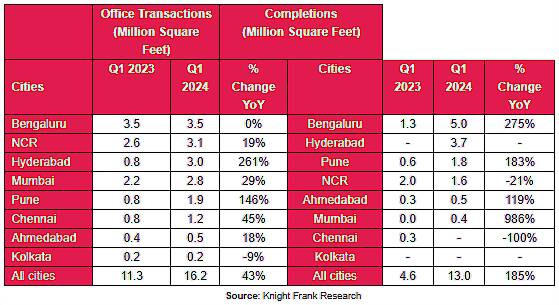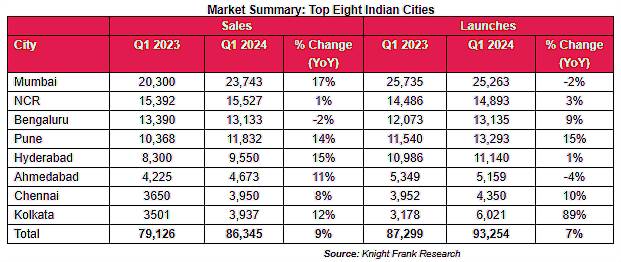
views
In the latest report, ‘India Real Estate: Residential and Office’ for January-March 2024 (Q1 2024), Knight Frank India revealed that Mumbai witnessed office space transactions totalling 2.8 million square feet (mn sq ft) during the quarter, marking a 29% year-on-year (YoY) increase. Additionally, office completions in Mumbai surged by 986% to reach 0.4 million sq ft in Q1 2024.
During Q1 2024, the major occupancy/leasing activity was driven by India India-facing businesses with 88% attribution.
Flex office areas accounted for over 9% share and 3% was occupied by third-party IT services.

Residential market
The residential market of Mumbai witnessed a total residential sales volume of 23,743 with a Year on Year (YoY) growth of 17% YoY which was the highest across the eight Indian cities. Over 25,263 units were launched in Mumbai during the same period. The average weighted residential price witnessed an increase of 6% YoY during Q1 2024 with a value of Rs 7,891 sq ft.

Mumbai observed a commendable growth of 259% in the ticket size category of above 10mn during Q1 2024. A total of 7,401 units were sold in this segment. For the ticket size under Rs 5 mn category, Rs 10,527 units were sold showcasing 13% YoY growth.
Shishir Baijal, chairman & MD, Knight Frank India, said, “The real estate market experienced another exceptional period characterised by robust performances in both the office and residential sectors. The residential segment particularly witnessed a significant surge, propelled by continued growth in sales in the higher price category of Rs 1 Crore and above. This not only demonstrates a strong demand trajectory but also reflects buyers’ confidence in making long-term commitments. Concurrently, the office sector maintained its upward trajectory, delivering one of the most impressive quarterly demand performances to date.”
“The country’s economic stability has spurred businesses operating in India to expand their operations, consequently driving demand for office spaces. Additionally, many companies are now reverting to conventional office setups, either reducing or discontinuing their work-from-home policies, further boosting demand. We anticipate these activities to continue at a robust pace in the foreseeable future backed by the stable economic policies and favourable domestic conditions,” Baijal added.




















Comments
0 comment